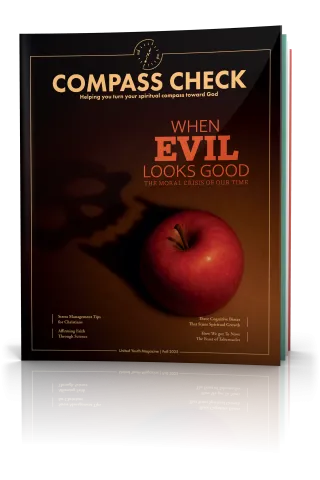Three Cognitive Biases that Stunt Spiritual Growth

Because we can only process so much information each day, our brains simplify things by making assumptions that feel familiar and comfortable. The problem is, those assumptions may not be rooted in truth.
What color socks did you put on today? Maybe you grabbed the first pair you saw in your drawer. Or perhaps you set out your outfit for the next day the night before. Either way, you probably didn’t think much about it.
Our brains are fantastic at creating mental shortcuts, which help us make decisions quickly. We were designed that way on purpose! Can you imagine how exhausting it would be if you had to carefully consider what flavor of toothpaste to use every single morning?
But our brains don’t just create shortcuts for little things. Without even realizing it, we also make big assumptions and snap judgments that can stunt our spiritual growth. These mental shortcuts are called cognitive biases—and they make it almost impossible for us to see the truth about ourselves clearly.
Scripture tells us that our natural thinking doesn’t align with God’s truth (Romans 8:7), which is why we need His help to see ourselves—and Him—more clearly.
What is Cognitive Bias?
A cognitive bias is a systematic error in thinking, which happens when we subconsciously interpret the world around us in a way that confirms what we already believe—even if that belief isn’t fully accurate.
Because we can only process so much information each day, our brains simplify things by making assumptions that feel familiar and comfortable. The problem is, those assumptions may not be rooted in truth.
The reality is that everyone is affected by cognitive bias at some point. It doesn’t mean we’re foolish or hopeless. It just means we’re human. The good news? With God’s help, we can learn to recognize when our thinking is being influenced by bias—and let Him reshape our minds. But first, we have to become aware of how it shows up.
So, let’s look at three of the most common cognitive biases, how they sneak into our spiritual lives, and what we can do to challenge them.
1. Confirmation Bias
This is one of the most well-known cognitive biases—and for good reason. Confirmation bias is what happens when we tend to only notice, believe and accept information that supports what we already believe. At the same time, we tend to ignore or push away anything that challenges those beliefs—often without even realizing it.
In our spiritual lives, confirmation bias keeps us stuck. It hinders us from growing in our understanding of Scripture, and it can even prevent us from accepting the gentle correction that leads to repentance.
One place this shows up is in how we respond to preaching—especially when the message becomes uncomfortably corrective.
Have you ever listened to a sermon and thought something like, “Wow, this feels a little harsh,” or “The minister just doesn’t understand what I’m dealing with”? Those thoughts are a normal reaction from the carnal mind—but they are also signs of confirmation bias in action.
If our default belief is “I’m a good person,” then any message that challenges that—even lovingly—feels like a threat.
We know that Jesus dealt with this very same phenomenon in His time, as He says in Matthew 13:15 , “Their ears are hard of hearing, and their eyes they have closed.” They had the most loving teacher possible, but their bias didn’t let them hear what Jesus was telling them.
The truth is, the minister isn’t creating new rules or judging us personally. He’s simply teaching God’s Word. And if God’s Word is asking us to change, it’s not because God hates us or doesn’t understand us—it’s because He loves us too much to leave us where we are.
Interestingly, this bias is so common that it often leads right into—and reinforces—the next two.
2. The Fundamental Attribution Error
This bias is all about how we explain behavior—both our own and other people’s.
The fundamental attribution error happens when we give ourselves the benefit of the doubt—like saying, “I was just having a rough day”—but then we judge others’ actions as a reflection of their character—like thinking, “They’re just rude or lazy.” In a spiritual setting, this might sound like:
“Yeah, I’ve missed church a couple of weeks in a row, but I’ve had a lot going on with school. God knows my heart.”
But then:
“That other family is always late to services. It’s so distracting. They’re clearly not taking church seriously.”
Do you see the pattern?
We excuse our own slip-ups while magnifying others’ mistakes. But when we do that, we quietly shift the focus off of our own need for growth—and we end up comparing ourselves to others rather than measuring ourselves by God’s standards.
The apostle Paul dealt with this same bias in the first century Church. He wrote, “But they are only comparing themselves with each other, using themselves as the standard of measurement. How ignorant!” (2 Corinthians 10:12, New Living Translation)
The result? Spiritual growth slows down or even stops, because we’re no longer looking inward. Instead of asking God to work on us, we start mentally listing all the ways other people need to change.
3. The Bias Blind Spot
Here’s the twist: even once we know about cognitive biases, we’re still most likely to see them in other people—not ourselves.
This is known as the bias blind spot. It’s when we believe we’re thinking clearly and objectively . . . while everyone else is being biased or unreasonable.
You might be reading this list and thinking, “Oh yeah, I know someone who does that!”—and that’s a totally human reaction.
But this bias reminds us how easy it is to spot flaws in someone else’s thinking while completely overlooking our own. We all like to think we’re rational, level-headed people. And sometimes we are! But we also all have blind spots—and only God can reveal them. After all, without God, “the human heart is the most deceitful of all things, and desperately wicked. Who really knows how bad it is?” (Jeremiah 17:9, NLT)
So, What Now?
Recognizing these biases isn’t about shaming ourselves or others. It’s about becoming aware of how our minds work so that we can invite God to do what only He can do—renew us from the inside out.
Our human nature leans toward self-protection, self-justification and comparison. But through His Spirit, God gives us the power to think differently, to see clearly and to grow into the people He’s calling us to be.
Ask God to search your heart and gently uncover any bias that’s getting in the way of truth.
You’re not expected to be perfect today. But if you keep your eyes open to yourself, you can “let patience have its perfect work, that you may be perfect and complete, lacking nothing” (James 1:4).
Don’t be afraid to ask God to show you what you can’t yet see—He promises to help you, strengthen you and walk with you every step of the way. Lean into His guidance and take the next step forward, knowing that every time you choose truth over comfort, you’re growing into the person He created you to be.
Article adapted from sermon by Roderick Foster, “Excuses We Make to Avoid Change.”






